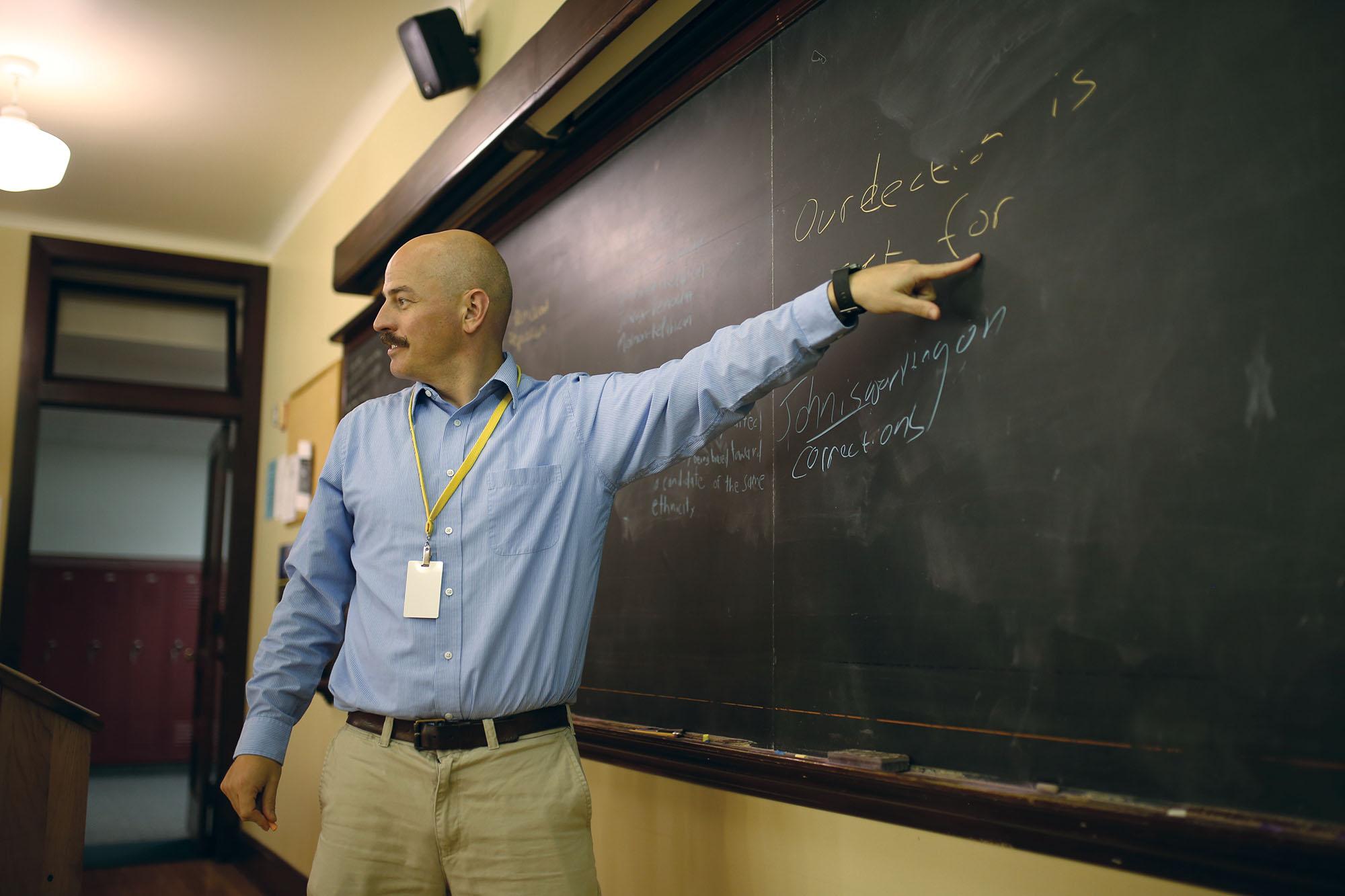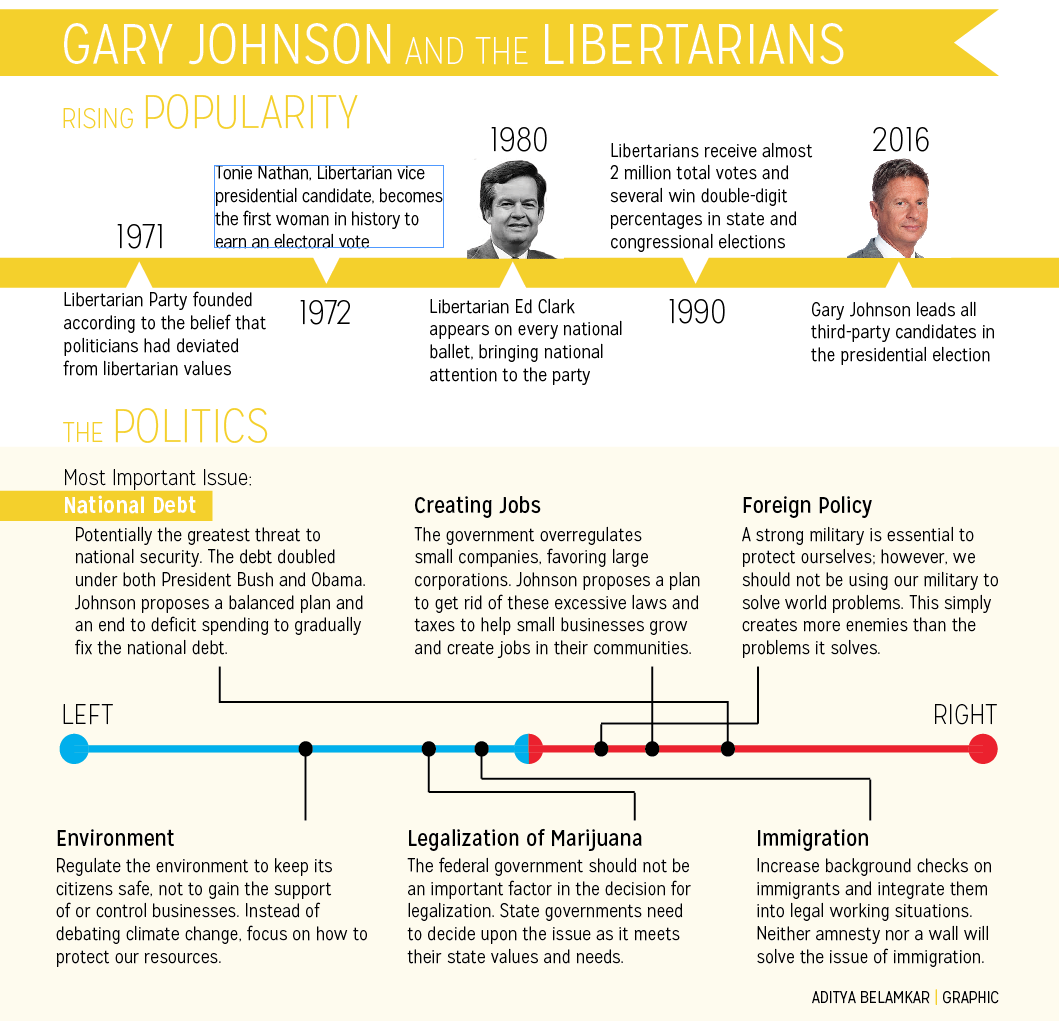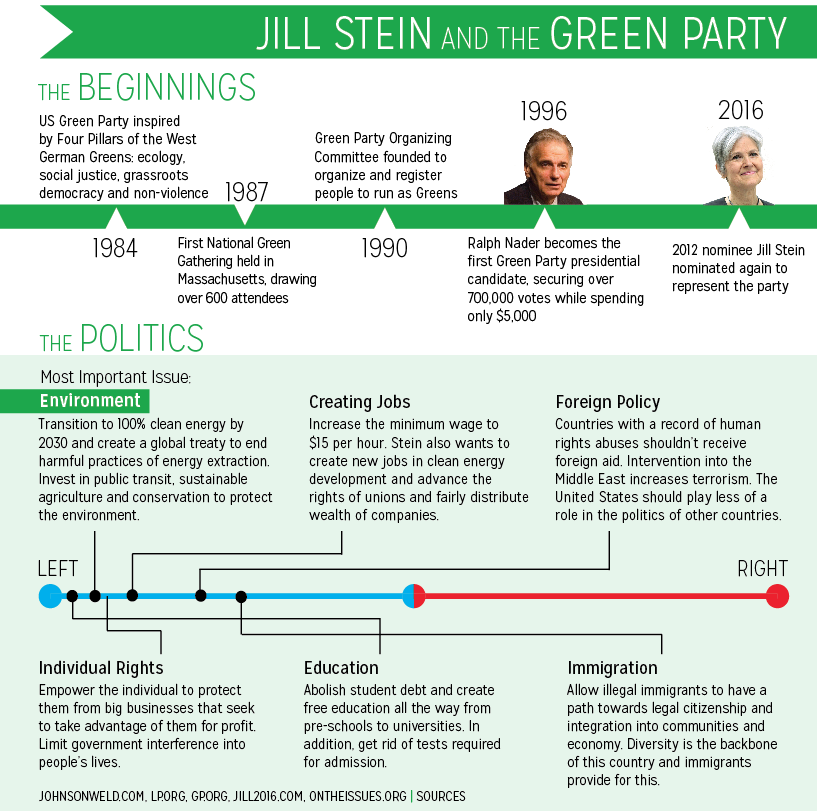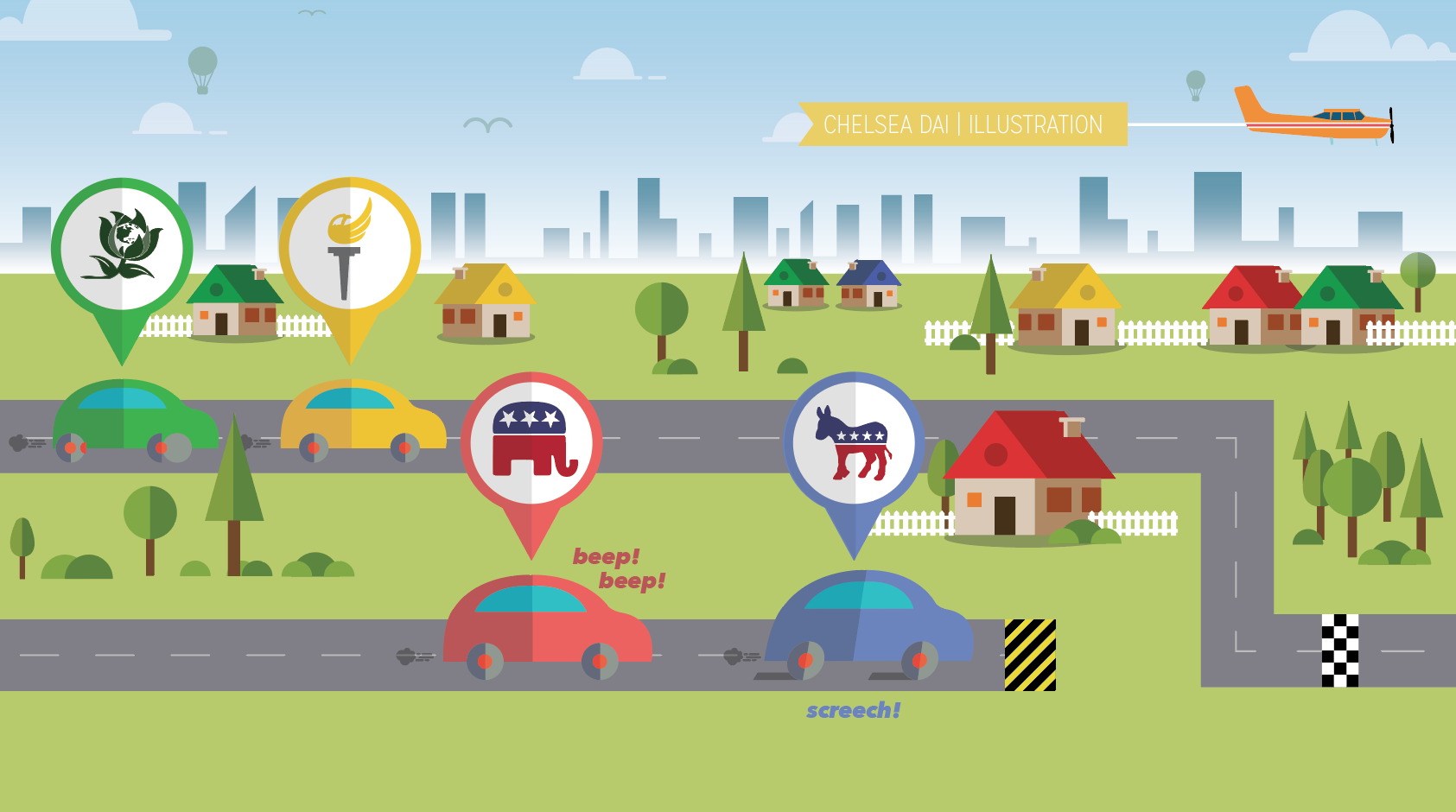Your donation will support the student journalists of Carmel High School - IN. Your contribution will allow us to purchase equipment and cover our annual website hosting costs.
NO LONGER THIRD-WHEELING
With polarizing candidates on both sides, many find themselves turning to third party candidates despite difficulty of getting into the public eye.
October 13, 2016
Donald Trump and Hillary Clinton are the nominees for the Republican and Democratic party, respectively. While they did win enough votes in the primary election season, both candidates have as many detractors as they do supporters. According to a Roper Center poll, Clinton and Trump average “strong unfavorable” ratings at 37 percent and 53 percent, respectively. With two of the most polarizing figures in political history both achieving the traditional big two parties’ nomination, many people, like Mitchell Adzema, Jill Stein supporter and sen

THIRD-PARTY THINKING: Government teacher Joshua Miller gestures toward his classroom’s blackboard. Miller said there were too many obstacles for third-party candidates in U.S. elections.
ior, said they have been compelled to look at other candidates.
“During the primaries, I backed Republican Chris Christie; when he dropped out, I didn’t like any of the other candidates, and I wasn’t too fond of the two liberal candidates (in the Democratic Party),” Adzema said. “I think this election has enlightened me because of my disdain for the vast majority of candidates, and it has really forced me to find a third party.”
Stein is the Green Party presidential nominee and one of four candidates who will be on the ballot in enough states to be mathematically eligible for president. Aside from the Republican and Democratic nominees, the other candidate is Libertarian Party nominee Gary Johnson, who will appear on the ballot in all 50 states, a first for a non-independent, third-party candidate.
Business teacher Richard “Chard” Reid, a Libertarian party member who has run for local office in prior elections, said he originally identified as a Republican for his first 10 voting-eligible years before changing party affiliation.
“Reading the works of Ron Paul, Ludwig von Mises and Henry Hazlitt really influenced my philosophy of economic policy and civil liberties,” Reid said. “I slowly began to realize that the two parties were two sides of the same coin. Republicans want big government on social issues, and Democrats want big government on economic policies.”
In a poll of veterans and military families conducted by the Military Times, Johnson received 36.5 percent of the vote, just behind Trump’s 37.5 percent and far outpacing Clinton’s 16.3 percent. Polling numbers are incredibly important to candidates because 15 percent across a previously selected group of five polls is the threshold a candidate must meet to be invited by the Commission on Presidential Debates (CPD) to debate on stage. Because of that threshold, despite their poll numbers and being mathematically eligible to win enough votes in the electoral college, both Johnson and Stein failed to meet the CPD’s criteria. A lawsuit launched by both the Libertarian and Green Parties against the CPD on the grounds of violating antitrust laws, arguing that the Republican-and-Democrat-controlled CPD attempt to maintain a “duo-opoly” over the “marketplace of ideas,” was tossed out by U.S. District Court Judge Rosemary Collyer on Aug. 4.
 To government teacher Joshua Miller, that threshold is too high and prohibits a true democratic election.
To government teacher Joshua Miller, that threshold is too high and prohibits a true democratic election.
“It’s hard to even get on the ticket with the hoops you have to jump through,” Miller said. “The idea that we’re eliminating these people from A, trying to keep them off the ballot, and B, out of the debates, is preposterous to me. You go to the grocery store and you have how many choices of soda? Or candy? You have hundreds. We come down to a presidential election and you get two. So why not open this up?”
In the 1992 election, Ross Perot, an independent, was invited to participate in the debates even though he was polling at just 8 percent. However in the 1996 election, Perot was kept off the debate stage despite polling as high as 19 percent and evidence that he had clearly affected the outcome of the previous election. Afterwards, the CPD established the 15 percent threshold, and since then no third-party candidate has ever qualified for the debates. According to a Quinnipiac University poll, 62 percent favor including Johnson in the presidential debates. For many, the debate stage is the only time they can truly compare candidates.
According to Adzema, being able to debate is an important step in legitimizing a third-party candidate.
“At least from the people I talk to, these debates mean a lot. You can go in backing one candidate and then do a complete 180 after the debate,” Adzema said. “So having more voices can do nothing but good.”
Due to the comparatively little media attention third-party candidates typically get, CNN hosting two town halls for Johnson and one for Stein, notwithstanding the vast majority of the electorate does not know about them or their stances on important issues. Reid, who ran as the Libertarian candidate for the Fifth Congressional District of Indiana in 2012, said he experienced this firsthand. Reid said many people have misconceptions that Libertarians, due to sounding very similar to “liberal,” are similar to Democrats, or that they are all “pot smokers.”
Adzema said many people believe Green Party candidates are focused solely on environmental issues; however, he said he is influenced more by Stein’s educational policies, something Adzema said he hopes will benefit his grandchildren. For his part, Johnson has stated several times that he believes most Americans are “closet Libertarians,” in that a majority of people agree with the socially liberal and fiscally conservative Libertarian principles but just don’t realize it. According to Adzema, this is because of the lack of media attention.
“Because the media isn’t covering third-party candidates, nobody knows about them, even if they align more with their ideals,” Adzema said. “Our generation is so engrossed in media all the time that if a third-party candidate can get a little coverage, he can get in the minds of voters.”
However, it can be difficult for many to people to get over their fear of voting for third-party candidates. In the 2012 presidential election, Johnson, again as the Libertarian candidate, received 1.2 million votes, or 1 percent of the electorate. It was the third-best non-independent third-party performance in U.S. history. In addition, a September 2015 Gallup poll showed that 60 percent of Americans believe a third party is needed because the Republican and Democratic parties “do such a poor job.”
Adzema said he understands why people would not vote third party, even if they wanted to.
“It feels like your vote doesn’t count, especially if you want to vote for a candidate who may not get anything more than 1 percent of the vote,” Adzema said.
Reid said he used to criticize people for voting third party due to t he idea that voting third party is essentially “throwing away” your vote. However, Reid said he now has an entirely different philosophy.
he idea that voting third party is essentially “throwing away” your vote. However, Reid said he now has an entirely different philosophy.
“(People) believe the lie that voting for the third party is throwing away your vote when in reality, voting for something you don’t believe in is the epitome of throwing away your vote,” Reid said. “They’re voting for the lesser of two evils, but what they’re really doing is strengthening the hold the two parties have on the political process.”
Reid said he believes this is the perfect election cycle to vote third party in order to showcase the true level of dissatisfaction with both of the dominant parties. While Adzema said he does not believe Stein or Johnson will win, he also said this election cycle could make voting for third parties more normal in the future, making a big dent in the historical dominance the Democratic and Republican parties have held, a dominance built on voters’ fears,
“But the biggest reason (people don’t vote third party), I think, is fear,” Reid said. “‘If you don’t vote for me, the other guy will win.’ The two parties have consistently remained in power because they have convinced voters that if they do not vote the party line, the other team is going to win.”
Many point to the 2000 presidential election as proof that their fear is very real. Democrat Al Gore won the popular vote but lost the electoral vote to Republican George W. Bush by five votes, and thus the election, with the key swing state being Florida. In Florida, Bush won by only 537 votes, giving him all of Florida’s electoral votes. Green Party candidate Ralph Nader garnere d 97,488 votes in Florida. Because the Green Party was born out of the Democratic Party, the initial assumption by many experts was Green Party voters would have voted Democrat if Nader had not run. Although later analysis showed this to be more questionable than originally thought, many still point to this and say Nader stole votes from Gore and thus allowed Bush to win the election.
d 97,488 votes in Florida. Because the Green Party was born out of the Democratic Party, the initial assumption by many experts was Green Party voters would have voted Democrat if Nader had not run. Although later analysis showed this to be more questionable than originally thought, many still point to this and say Nader stole votes from Gore and thus allowed Bush to win the election.
However, Miller said he does not see it as “vote-stealing.”
“I don’t think Nader spoiled the election for Gore,” Miller said. “Did he steal those votes? No, I mean he went out and spent a lot of money, he raised a lot of money, comparatively speaking, and he did the work. Are they (Nader’s) votes? He sure earned them.”
While he acknowledges that Johnson winning the election is unrealistic, Reid said he hopes the interest in third-party candidates transfers to the local level, where it may mean more. Reid himself garnered 4 percent of the vote in his congressional election and received an endorsement from the Indianapolis Star, the first time the paper had endorsed a non-Republican or non-Democrat. Adzema said he is going to donate $100 to $150 to Stein and has already signed up to volunteer for her.
“Especially because she is a third- party candidate, I feel a responsibility to donate and volunteer as much as I can,” Adzema said. “If I don’t do anything, who will?”
